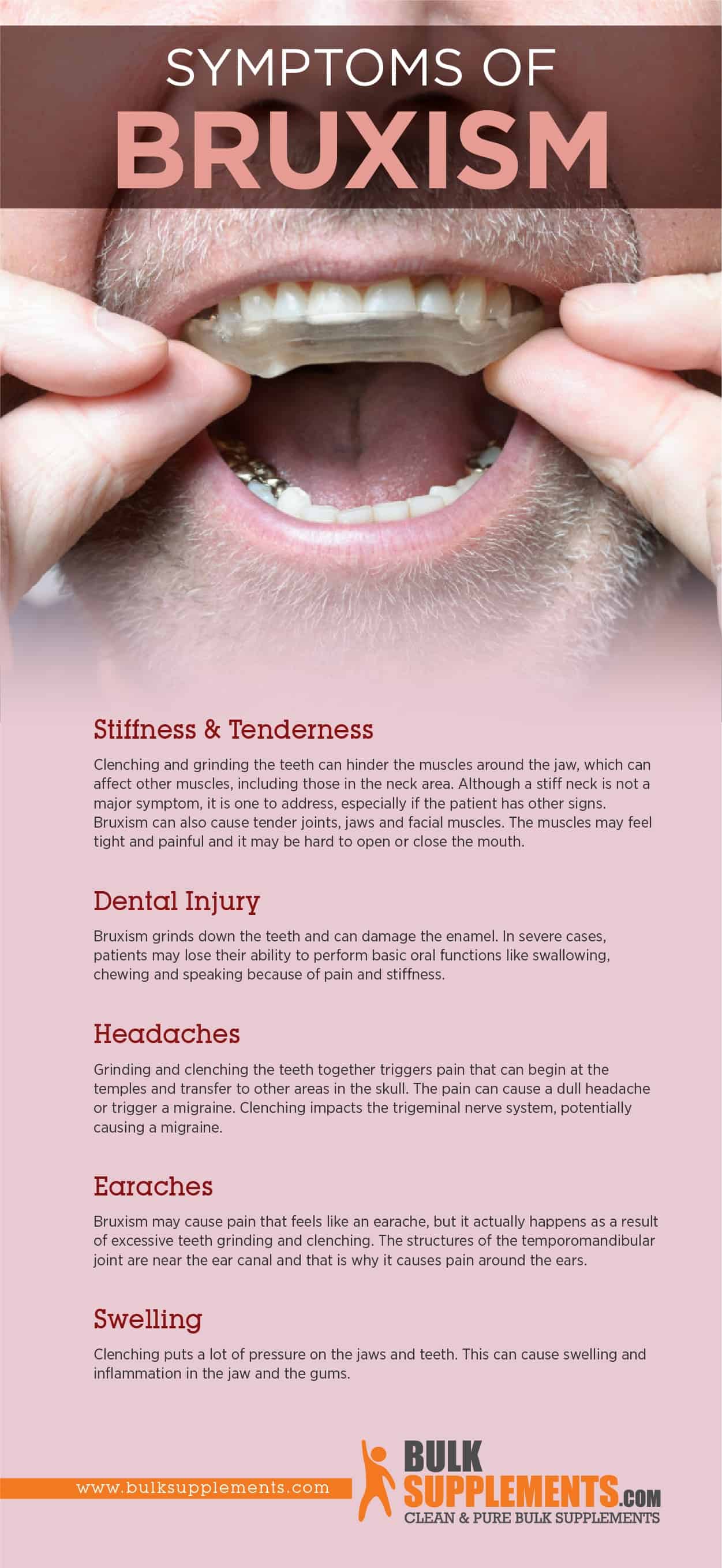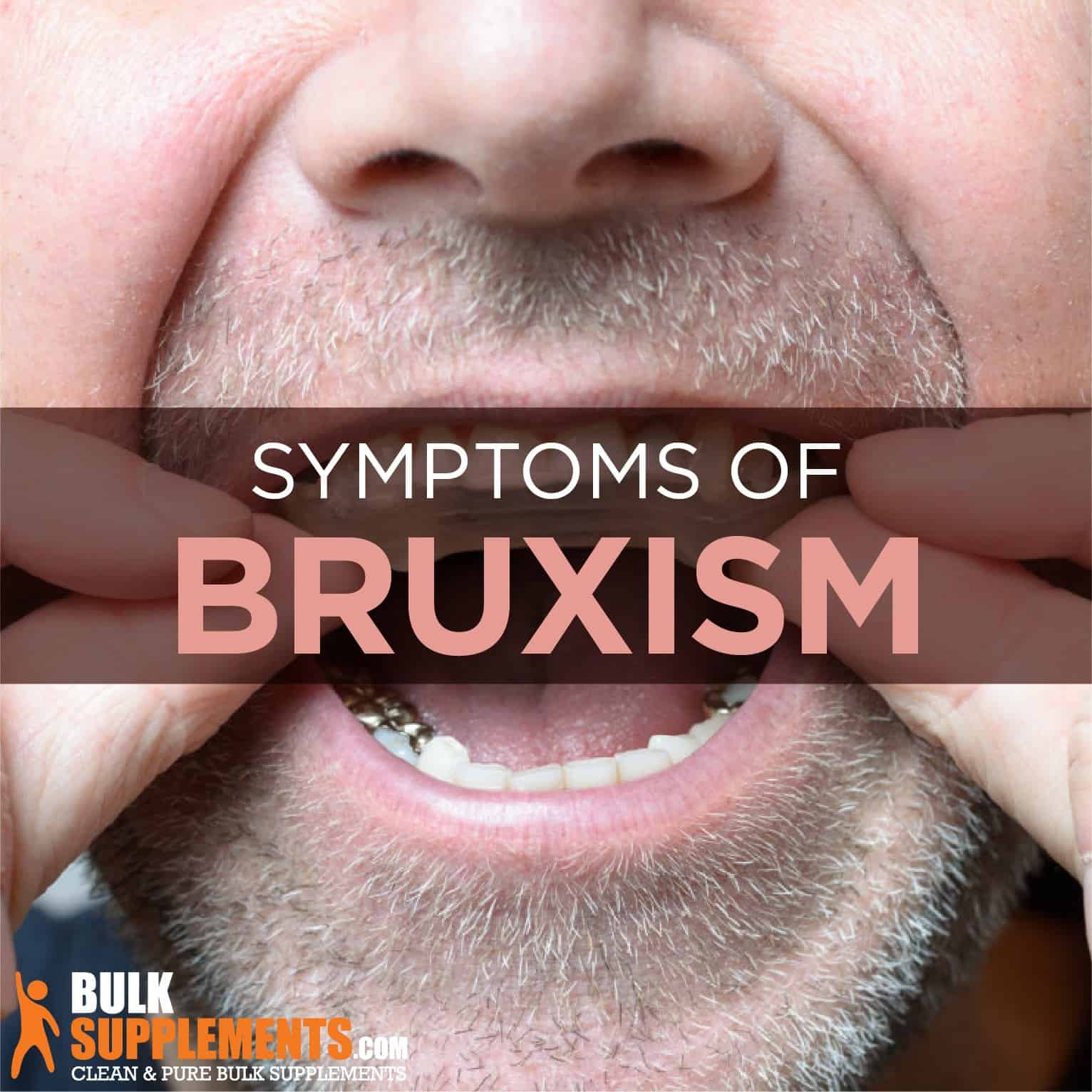What is Bruxism?
Bruxism is a sleep-related movement disorder in which the patient grinds, gnashes and clenches their teeth. The teeth rub together as the jaw moves forcefully back and forth or from side to side. People with bruxism may unconsciously grind their teeth when they are awake (awake bruxism) or during sleep (sleep bruxism) (x).
Women are more likely to develop awake bruxism than men. However, studies state that men and women experience sleep bruxism equally (x). The condition can occur in people of all ages, from children to adults. Nearly one in three people suffer from bruxism (x). The condition affects between 30 and 40 million people in the United States (x). Bruxism is not a dangerous condition, but it can cause damage to the teeth, making them short or fractured. It can also cause several uncomfortable symptoms, such as migraines, headaches and joint pain (x).
Sleep Bruxism
Although bruxism is an unconscious action whether the patient is awake or asleep, sleep bruxism is considered a bigger health concern because it may cause more severe damage. It belongs to a group of sleep disorders. People with sleep bruxism are not consciously aware that they are grinding their teeth, meaning the act continues for longer periods of time and causes more damage (x).
If the condition is untreated, it can cause dental problems like worn down enamel, teeth, fillings and crowns. It can also cause jaw pain, temporomandibular joint (TMJ) disorder, myofascial muscle pain and headaches (x, x, x). People with sleep bruxism can also have sleep disorders like snoring and sleep apnea (x). Sleep bruxism interferes with sleep quality because the grinding makes the muscles tense and the patient is unable to relax.
Causes of Bruxism
Doctors have not concluded the exact cause of bruxism. However, there are two types. Primary bruxism occurs on its own without the influence of any medical condition. Secondary bruxism results from drug use or neurological health conditions (x).
Some experts consider it a habit, while others believe certain factors trigger it like stress, frustration, tobacco use, regular alcohol consumption, genetics and recreational drugs. Since researchers cannot specifically define the causes, they believe it may result from a combination of genetic, physical and psychological factors (x).
Stress
Increased stress, anger, frustration and anxiety can cause patients to grind their teeth in an attempt to cope. Physicians consider stress as the biggest contributor by the American Dental Association (ADA) (x). Almost 70 percent of bruxism cases are a result of stress (x). Patients can reduce stress by taking a walk, taking a warm bath and exercising. Exercise triggers endorphins, which improve mood and offer tremendous stress relief (x). Children diagnosed with an anxiety disorder should undergo regular dental checkups to prevent persistent teeth breakage and damage to their enamel (x).
Sleep Disorders
Doctors also associate psychological factors with bruxism, including sleep disorders like snoring, sleep apnea and sleep talking (x). Sleep apnea interferes with the patient’s ability to breathe while they are sleeping. Bruxism may be an unconscious response to blocked airways when the patient cannot breathe properly and the jaw muscles tighten to prevent airflow restriction.
Sleep Arousal
Some evidence suggests that bruxism could be linked to sleep-related arousals in which the cardiac and respiratory systems exhibit a rise in activity. These arousals can occur up to 15 times during sleep. They are often accompanied by increased muscle activity in the jaw, which triggers teeth grinding. These arousals are typical in individuals who snore or have sleep apnea (x).
Malocclusion
This condition develops when the jaw and teeth do not align correctly. People with the occlusal discrepancy—meaning the bottom and top teeth don’t meet correctly—are more likely to suffer from bruxism. This could be a result of crooked or missing teeth. Cases of bruxism that develop because of problems with the jaw may disappear after treatment. Potential interventions include jaw reconstruction or braces (x, x, x).
Risk Factors for Bruxism
Drugs & Medications
Bruxism could be a side effect of some psychiatric medications such as antidepressants, amphetamines and antipsychotics (x). Recreational drugs like cocaine, heroin, ecstasy and methamphetamine can also increase the risk of bruxism. These drugs stimulate the nervous system and trigger motor disorders that lead to bruxism (x).
Underlying Health Conditions
Research suggests that bruxism may correlate with medical disorders such as dementia, Alzheimer’s disease, Parkinson’s disease, epilepsy, gastrointestinal reflux disorder (GERD) and attention-deficit/hyperactivity disorder (ADHD) (x, x, x, x, x).
Alcohol
Regular or excessive alcohol consumption increases the risk of sleep bruxism. Alcohol consumption also seems to aggravate bruxism because it can alter sleep patterns. Poor sleep activates the muscles in the jaw and may cause the patient to grind their teeth (x).
Age
Bruxism is more common in young children, but the condition may disappear by the time the patient reaches the teenage and adult years (x, x). According to research, 8 percent of adults and around 14 to 20 percent of children under 11 years old grind their teeth at night (x). In another study, 38 percent of parents reported that their children age 17 or younger grind their teeth (x).
Heredity
Patients with a family history of teeth clenching or grinding may have an increased risk of developing bruxism themselves. Twin studies suggest that the condition may be genetic (x).
Symptoms of Bruxism
Bruxism does not always cause symptoms and some people may even have the condition without knowing it. However, it can cause several uncomfortable symptoms and it may lead to long-term damage.
Stiffness & Tenderness
Clenching and grinding the teeth can hinder the muscles around the jaw, which can affect other muscles, including those in the neck area. Although a stiff neck is not a major symptom, it is one to address, especially if the patient has other signs. Bruxism can also cause tender joints, jaws and facial muscles. The muscles may feel tight and painful and it may be hard to open or close the mouth (x, x).
Dental Injury
Bruxism grinds down the teeth and can damage the enamel. In severe cases, patients may lose their ability to perform basic oral functions like swallowing, chewing and speaking because of pain and stiffness (x).
Headaches
Grinding and clenching the teeth together triggers pain that can begin at the temples and transfer to other areas in the skull. The pain can cause a dull headache or trigger a migraine. Clenching impacts the trigeminal nerve system, potentially causing a migraine (x).
Earaches
Bruxism may cause pain that feels like an earache, but it actually happens as a result of excessive teeth grinding and clenching. The structures of the temporomandibular joint are near the ear canal and that is why it causes pain around the ears (x).
Swelling
Clenching puts a lot of pressure on the jaws and teeth. This can cause swelling and inflammation in the jaw and the gums (x).

Complications of Bruxism
Dental Injuries
Bruxism is not usually a dangerous condition, but it can cause a lot of damage to the teeth. Putting constant force on the enamel makes it weaker and even causes tiny fractures that can cause more breaks and chips in the teeth. Grinding the teeth can flatten, fracture or chip them (x).
Temporomandibular Joint Syndrome (TMJ)
TMJ is a pain in the temporomandibular jaw joint that connects the lower part of the jaw to the skull next to the ear. Severe bruxism can contribute to TMJ syndrome because it causes changes in teeth alignment that may also cause changes in the jaw joint (x).
Treatment for Bruxism
Patients may not require treatment if the condition is mild, but more serious symptoms can cause long-term damage. The appropriate form of treatment will vary depending on the cause of the problem. For example, if it is a result of a sleep disorder, the patient may need to undergo a sleep study (x). Regular dental checkups will also help identify bruxism so that the patient can receive treatment. There is no cure for bruxism, but there are options that manage the condition, relieve the symptoms and potentially address the underlying cause. Some of the possible remedies include:
Mouthguards
The American Academy of Oral Medicine recommends a sturdy mouth guard that will cover all the teeth in both the upper and lower arch (x). Mouth guards help cushion the teeth and prevent them from grinding against each other when the patient is sleeping.
Reductive Coronoplasty
This is intended to reshape the surface of the teeth, especially if the patient has misaligned, crowded or crooked teeth that cause the condition. The dentist can reshape the biting surface of the teeth using oral surgery, crowns or braces so that the teeth align properly. They may also perform additive coroplasty to build up the teeth (x).
Botulinum Toxin (Botox)
Dentists may recommend Botox injections to patients that do not benefit from other forms of treatments. Botox injections often reduce pain and lower the frequency at which the patient grinds their teeth (x). However, there is limited research to draw specific conclusions about how these injections benefit dental health.
Other Remedies
- Stress management by exercising or listening to music can help manage bruxism (x)
- Practice good sleep habits to manage sleep disorders that may cause bruxism (x)
- Avoid stimulating substances like caffeine in the evening (x)
Supplements for Bruxism
Magnesium
A magnesium deficiency can cause restlessness, insomnia, anxiety and hyperactivity. However, a magnesium supplement may help improve sleep quality. As a dietary supplement, take 1,300 mg (about ¾ tsp) of magnesium gluconate once or twice daily, or as directed by a physician.
Vitamin C
Commonly used to fight the common cold, Vitamin C is also involved in controlling how the body responds to stress. It also helps the body make dopamine in the brain, which affects mood (x). Take about 1,000 mg (¼ tsp) of ascorbic acid daily unless a doctor recommends a different dosage. Vitamin C can also be found in food, including oranges, broccoli, strawberries and guava.
Valerian Root
Historically, valerian root has been used as a natural anxiety treatment and research suggests that it may also help improve sleep quality (x, x). Take 300 to 600 mg of valerian root extract powder daily two hours before sleep, or as directed by a physician.
Vitamin B5
Also known as pantothenic acid, Vitamin B5 can help balance mood. Studies show that it also helps with stress management because it helps the body produce coenzyme A, which helps make cortisol and epinephrine. Both of these chemicals help the body manage stress. As a dietary supplement, take 550 mg of Vitamin B5 powder once a day unless a physician advises a different dosage.
The Bottom Line
Bruxism can have adverse effects on the teeth and gums. It is a health condition in which an individual clenches or grinds their teeth unconsciously while they are not chewing. It is a very common condition, occurring in one in every three people. However, some people with the condition do not show any symptoms at all. There are two types of bruxism: primary and secondary. Primary bruxism is associated with an underlying medical condition or medication. Secondary bruxism, on the other hand, is not associated with a health condition. Stress is also a major factor that contributes to bruxism.
The condition does not usually cause dangerous complications, but there are several ways to manage it. Mouth guards and Botox injections can help stabilize the condition. Other remedies include exercise, stress management, practicing good sleep hygiene and having regular dental checkups. Supplements can also help address the underlying causes of bruxism, such as stress. Research states that magnesium, Vitamin C and valerian root may be effective methods to treat or help prevent some of the risk factors for bruxism. Always consult a doctor before beginning a supplement regimen. They are not an adequate treatment option for any medical condition, even though they may benefit overall health.


